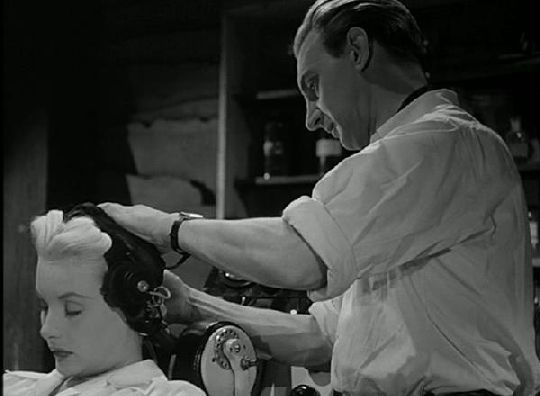Four Sided Triangle (1953) 
“She lived two amazing lives under his spell!”

Director: Terence Fisher
Cast: Barbara Payton, James Hayter, Stephen Murray
Synopsis: Bill and Robin, helped by their childhood friend, Lena, develop a “reproducer” which can exactly duplicate any object.
In 1953, Hammer Studios was still yet to embark on the ground-breaking revival of the horror icons that would see its fortunes sky rocket in the late 1950s, and the modestly budgeted Four Sided Triangle is one of its earliest SF movies. To be honest, the SF angle of the story is little more than a plot device which provides the trigger for a rather lame story of unrequited love. A couple of years before Four Sided Triangle was released, the studio had entered into a co-production deal with US producer Robert Lippert which saw a number of second-tier Hollywood stars cross the Atlantic to provide a familiar name upon which the movies could be sold in the States. For Four Sided Triangle, that star was Hollywood bad girl Barbara Payton, who was attempting to overcome a number of personal and romantic issues in order to put back on track a career that had derailed so spectacularly since her turn as Jimmy Cagney’s moll in Kiss Tomorrow Goodbye. Unfortunately for her, the decline was already too steep to halt, and within a few years she would be a hopeless alcoholic, working as a prostitute on Sunset Boulevard and sleeping rough in bus stations…
Payton was 26-years-old when Four Sided Triangle was released, while the two men who vie for her hand were 41 and 31, which is a bit strange considering they were all supposed to have grown up together in the sleepy English village of Howdean. Perhaps equally unusual is the fact that, although the two boys both go off to Cambridge, and the girl returns to the States with her mother, they all return to that sleepy village which. Let’s face it, would be the last place twenty-somethings would want to be. Anyway, I’m getting ahead of myself. The two young men are Robin (John Van Eyssen — Make Mine Mink) and Bill (Stephen Murray); Robin is the steady, sensible one, while Bill is brilliant and headstrong. Upon returning to Howdean, they build a laboratory in a shed. Now, although it’s one of those labs filled with retorts and boiling flasks containing bubbling liquids, they’re actually constructing an electronic device which can create an exact duplicate of any inanimate object.
Clearly, all those bubbling liquids — which would now doubt be an array of interesting colours had Four Sided Triangle been filmed in colour — must be there to impress the returning Lena, for whom both boys are carrying a mighty big torch. At least their attitude towards her isn’t as condescending as Bill’s former guardian and village doctor ‘Doc’ Harvey (James Hayter — Seven Waves Away, I Was Monty’s Double) who also serves as the film’s vaguely self-serving narrator, who suggests she stick around the village to look after the boys as they do their manly work. At first, Lena rightly turns down the Doc’s offer, but she eventually relents, which means she’s on hand to see their experiments finally pay off when they succeed in replicating the Doc’s watch. Shortly after this success, Bill confides in Doc about his love for Lena, but before he has the opportunity to let the woman in on his secret, his best friend Robin is announcing his engagement to her…
Any film which contains the invention of a machine capable of duplicating anything really should be about a machine that’s capable of duplicating anything, rather than about a limp love triangle involving a couple of wishy-washy men and a hot woman who wouldn’t give either of them the time of day in the real world. But director Terence Fisher, who also co-wrote, relegates the moral conundrum of just who should have control of the machine and to what purposes it should be put to little more than a few lines of dialogue with no clear outcome. The plot also relies on a number of highly intelligent characters being guilty of at best a blinkered view of the inevitable consequences of their actions, and at worst sheer stupidity. Similarly, you have to wonder at the judgment of a doctor who is all too willing to aid his young ward in a procedure which is, at the very least, counter to the moral and ethical code of the medical profession. Unfortunately, these incidences of unnatural behaviour are necessary for the plot to go where Fisher and co-writer Paul Tabori want to take it, which might just have been forgivable if, as a result they had fashioned a story of any quality. Sadly, all they can come up with is a tired story that fudges the opportunities open to it and fails to hold its audience interest.
(Reviewed 15th May 2014)
httpv://www.youtube.com/watch?v=jmbgBlhaxV8
